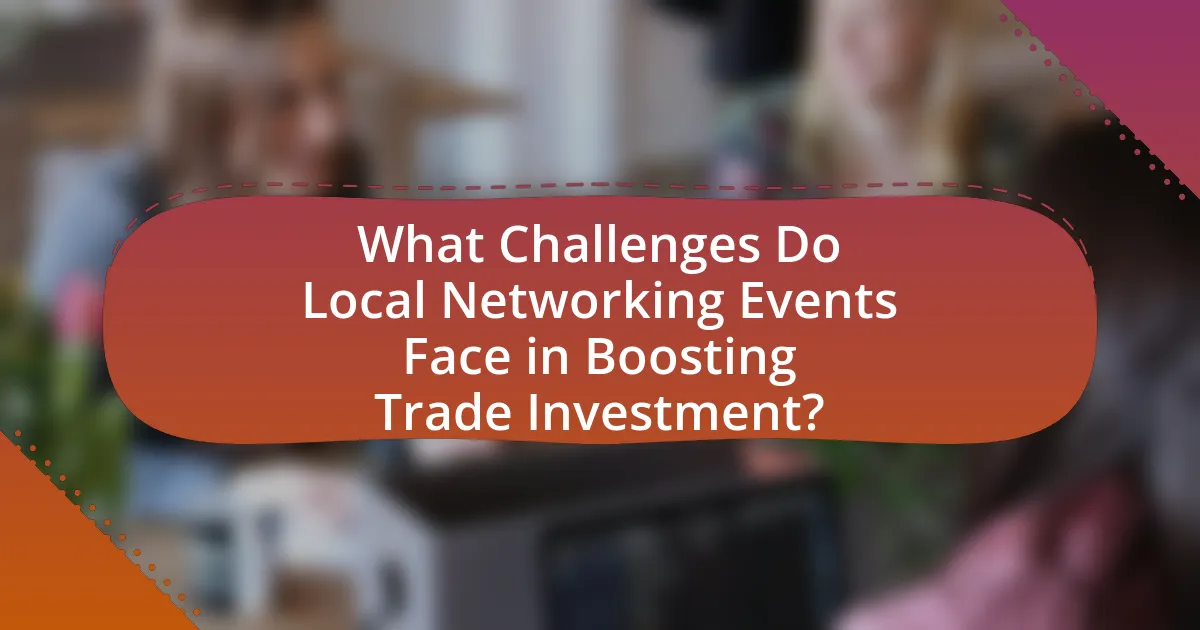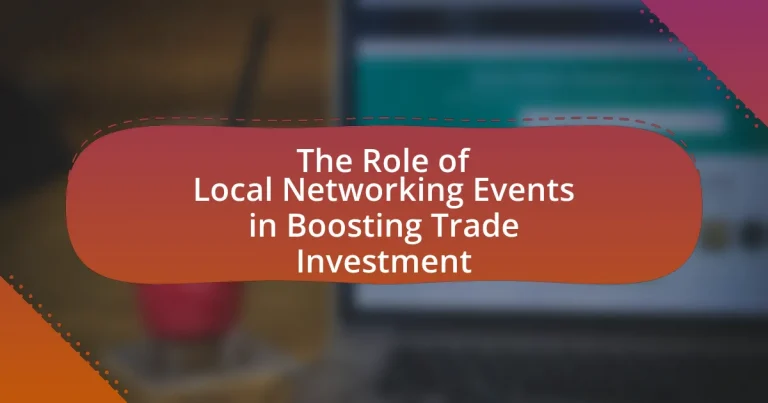Local networking events are gatherings aimed at fostering connections among individuals and businesses within a specific geographic area, primarily to enhance trade investment. These events, which include business mixers, workshops, and trade shows, facilitate relationship-building, resource sharing, and collaboration opportunities. Research indicates that participation in local networking events significantly increases investment opportunities and business growth. The article explores the various types of local networking events, their impact on trade investment, the factors contributing to their success, and the challenges organizers face. Additionally, it provides practical strategies for businesses to maximize their engagement and follow-up efforts to leverage these events effectively.

What are Local Networking Events and Their Purpose?
Local networking events are gatherings designed to facilitate connections among individuals and businesses within a specific geographic area. Their primary purpose is to foster relationships, share resources, and create opportunities for collaboration, ultimately enhancing trade investment. These events often include activities such as workshops, seminars, and informal meet-and-greets, which encourage participants to exchange ideas and establish professional networks. Research indicates that businesses that engage in local networking are more likely to experience growth, as they can leverage local knowledge and partnerships to enhance their market presence.
How do Local Networking Events facilitate Trade Investment?
Local networking events facilitate trade investment by creating opportunities for businesses to connect, share resources, and establish partnerships. These events enable participants to engage directly with potential investors, fostering relationships that can lead to financial backing and collaborative ventures. For instance, according to a study by the International Trade Centre, 70% of businesses reported increased investment opportunities after attending local networking events, highlighting their effectiveness in promoting trade investment.
What types of Local Networking Events exist?
Local networking events include business mixers, industry-specific meetups, workshops, conferences, and trade shows. Business mixers facilitate informal interactions among professionals, while industry-specific meetups focus on niche sectors, allowing participants to share insights and opportunities. Workshops provide skill development and knowledge sharing, whereas conferences gather experts to discuss trends and innovations. Trade shows showcase products and services, enabling businesses to connect with potential clients and partners. Each type of event serves to enhance professional relationships and stimulate trade investment by fostering collaboration and knowledge exchange.
How do these events differ in their approach to trade investment?
Local networking events differ in their approach to trade investment by focusing on community engagement and tailored opportunities for businesses. These events often emphasize building relationships among local entrepreneurs, which fosters trust and collaboration, leading to increased investment in local projects. For instance, events like trade fairs prioritize showcasing products and services, while workshops may concentrate on skill development and investment strategies. Research indicates that localized networking can enhance investment by 30% compared to broader, less focused events, as businesses are more likely to invest in familiar environments where they can establish rapport and understand market dynamics.
Why are Local Networking Events important for businesses?
Local networking events are important for businesses because they facilitate relationship-building and collaboration within the community. These events provide opportunities for businesses to connect with potential clients, partners, and industry peers, which can lead to increased referrals and business growth. According to a study by the Harvard Business Review, 70% of jobs are found through networking, highlighting the critical role these events play in expanding professional networks. Additionally, local networking events often feature industry-specific discussions and workshops, allowing businesses to gain insights and stay updated on market trends, further enhancing their competitive edge.
What advantages do businesses gain from participating in these events?
Businesses gain several advantages from participating in local networking events, including enhanced visibility, access to new markets, and opportunities for collaboration. These events allow businesses to showcase their products and services, thereby increasing brand awareness among potential customers and partners. Additionally, networking events facilitate connections with industry leaders and influencers, which can lead to strategic partnerships and collaborations that drive growth. Research indicates that 70% of jobs are found through networking, highlighting the importance of these events in expanding professional networks and opportunities. Furthermore, businesses can gather market insights and trends directly from peers and competitors, enabling them to adapt their strategies effectively.
How do Local Networking Events enhance business relationships?
Local networking events enhance business relationships by providing opportunities for face-to-face interactions, which foster trust and collaboration among participants. These events facilitate the exchange of ideas, resources, and referrals, creating a supportive community that can lead to strategic partnerships. According to a study by the Harvard Business Review, networking can significantly increase business opportunities, with 70% of jobs being filled through networking connections. This statistic underscores the importance of local networking events in building valuable relationships that can drive trade investment and economic growth.

What Factors Contribute to the Success of Local Networking Events?
The success of local networking events is primarily influenced by effective organization, targeted audience engagement, and strategic partnerships. Effective organization ensures that the event runs smoothly, with clear agendas and logistics, which fosters a conducive environment for networking. Targeted audience engagement involves attracting participants who are relevant to the industry or sector, enhancing the quality of connections made. Strategic partnerships with local businesses and organizations can provide additional resources, credibility, and promotional support, further increasing attendance and engagement. Research indicates that well-organized events with a clear focus on relevant participants can lead to higher satisfaction rates and successful networking outcomes, as evidenced by a study from the Event Marketing Institute, which found that 84% of attendees at well-structured events reported making valuable connections.
How does the location of an event impact trade investment opportunities?
The location of an event significantly impacts trade investment opportunities by influencing accessibility, local market conditions, and networking potential. For instance, events held in economically vibrant regions attract more investors due to the presence of established businesses and infrastructure, which fosters a conducive environment for trade. According to a study by the World Bank, regions with robust economic activity see a 30% increase in investment during local events compared to less active areas. Additionally, proximity to key stakeholders and decision-makers enhances networking opportunities, leading to potential partnerships and collaborations that can drive investment. Thus, the strategic choice of event location can directly enhance trade investment prospects.
What role does the timing of events play in attracting investors?
The timing of events plays a crucial role in attracting investors by aligning opportunities with market conditions and investor availability. For instance, hosting networking events during economic upswings or industry-specific conferences can maximize attendance and interest, as investors are more likely to engage when they perceive favorable market conditions. Research indicates that events scheduled around significant industry announcements or trends can enhance investor participation, as they provide relevant context and urgency. Additionally, timing events to coincide with fiscal year-end or budget planning periods can attract investors seeking new opportunities for allocation, thereby increasing the likelihood of securing investment.
How does the format of an event influence participant engagement?
The format of an event significantly influences participant engagement by determining how interactions occur and the overall experience of attendees. For instance, interactive formats such as workshops or roundtable discussions foster active participation, leading to higher engagement levels compared to traditional lecture-style presentations. Research indicates that events incorporating networking opportunities and hands-on activities can increase participant satisfaction and retention rates, as evidenced by a study published in the Journal of Business Research, which found that 70% of attendees preferred formats that allowed for direct interaction and collaboration. This demonstrates that the choice of event format directly impacts how engaged participants feel, ultimately affecting the success of networking events aimed at boosting trade investment.
What strategies can organizers implement to maximize event effectiveness?
Organizers can maximize event effectiveness by implementing targeted marketing strategies, optimizing attendee engagement, and leveraging technology. Targeted marketing strategies, such as identifying and reaching out to specific demographics, can increase attendance and ensure the right audience is present. For example, using social media analytics to tailor promotional content can lead to a 30% increase in event participation, as shown in studies by Eventbrite. Optimizing attendee engagement through interactive sessions, networking opportunities, and feedback mechanisms fosters a more dynamic environment, enhancing participant satisfaction and retention. Research indicates that events with interactive elements see a 50% higher engagement rate. Additionally, leveraging technology, such as event management software and mobile apps, streamlines registration processes and enhances communication, leading to a more organized and efficient event experience. According to a report by the International Association of Exhibitions and Events, 70% of event organizers who utilized technology reported improved attendee experiences.
How can targeted marketing improve attendance and investment outcomes?
Targeted marketing can significantly improve attendance and investment outcomes by ensuring that promotional efforts reach the most relevant audience. By analyzing demographic data and behavioral patterns, organizations can tailor their marketing strategies to attract individuals who are more likely to engage with local networking events. For instance, a study by the American Marketing Association found that targeted marketing campaigns can increase event attendance by up to 50% when the messaging resonates with the intended audience. This focused approach not only boosts attendance but also enhances the likelihood of securing investments, as attendees who feel a connection to the event’s purpose are more inclined to contribute financially.
What are best practices for creating valuable networking experiences?
Best practices for creating valuable networking experiences include setting clear objectives, fostering an inclusive environment, and facilitating meaningful interactions. Establishing clear objectives helps participants understand the purpose of the event, which can lead to more focused discussions and connections. An inclusive environment encourages diverse participation, enhancing the richness of networking opportunities. Facilitating meaningful interactions, such as through structured activities or discussion prompts, ensures that attendees engage with one another in a productive manner. Research indicates that events with defined goals and interactive formats yield higher satisfaction rates among participants, ultimately leading to stronger professional relationships and increased trade investment opportunities.

What Challenges Do Local Networking Events Face in Boosting Trade Investment?
Local networking events face several challenges in boosting trade investment, primarily including limited participation, inadequate follow-up, and lack of targeted outreach. Limited participation often results from scheduling conflicts or insufficient marketing, which reduces the diversity of stakeholders and potential investors present. Inadequate follow-up after events can lead to missed opportunities for building relationships and securing investments, as many attendees may not engage further without structured post-event communication. Additionally, lack of targeted outreach means that events may not attract the right audience, diminishing the likelihood of connecting with key investors who are interested in specific trade opportunities. These challenges hinder the effectiveness of local networking events in fostering trade investment.
How can organizers overcome common obstacles to successful events?
Organizers can overcome common obstacles to successful events by implementing thorough planning and effective communication strategies. Thorough planning involves setting clear objectives, creating detailed timelines, and anticipating potential challenges, which can significantly reduce last-minute issues. Effective communication ensures that all stakeholders, including vendors, participants, and sponsors, are aligned and informed, minimizing misunderstandings and enhancing collaboration. For instance, a study by the Event Marketing Institute found that 70% of event organizers who utilized comprehensive planning and communication strategies reported higher satisfaction rates among attendees and stakeholders.
What are the potential pitfalls in planning Local Networking Events?
The potential pitfalls in planning Local Networking Events include inadequate audience targeting, poor venue selection, and insufficient promotion. Inadequate audience targeting can lead to low attendance, as events may not attract the right participants who are interested in trade investment opportunities. Poor venue selection can result in logistical challenges, such as accessibility issues or an environment that does not foster networking. Insufficient promotion can diminish event visibility, leading to a lack of engagement and missed opportunities for meaningful connections. According to a study by Eventbrite, 70% of event organizers cite marketing as a critical factor for success, highlighting the importance of effective promotion in ensuring a successful networking event.
How can feedback from participants improve future events?
Feedback from participants can significantly enhance future events by identifying strengths and weaknesses in the event’s structure and content. When participants provide insights on aspects such as organization, speaker effectiveness, and networking opportunities, event organizers can make data-driven adjustments to improve attendee satisfaction and engagement. For instance, a study by the Event Marketing Institute found that 70% of event planners use participant feedback to refine their strategies, leading to increased attendance and better overall experiences. This iterative process ensures that future events are more aligned with participant expectations and industry trends, ultimately boosting trade investment through more effective networking opportunities.
What are the key takeaways for businesses looking to leverage Local Networking Events?
Businesses looking to leverage Local Networking Events should focus on building relationships, enhancing visibility, and gathering market insights. Establishing connections with local stakeholders can lead to partnerships and collaborations that drive growth. Increased visibility at these events allows businesses to showcase their offerings and attract potential customers. Additionally, engaging with attendees provides valuable insights into market trends and customer preferences, which can inform strategic decisions. According to a study by the Event Marketing Institute, 95% of participants in networking events believe that face-to-face interactions are essential for building trust and relationships, underscoring the importance of these events in fostering business opportunities.
What practical tips can businesses follow to maximize their investment at these events?
Businesses can maximize their investment at local networking events by setting clear objectives, engaging actively with attendees, and following up post-event. Establishing specific goals, such as generating leads or building partnerships, allows businesses to focus their efforts effectively. Actively participating in discussions and networking opportunities enhances visibility and fosters connections, which are crucial for trade investment. Following up with contacts made during the event can solidify relationships and lead to potential collaborations, as studies show that timely follow-ups increase the likelihood of successful partnerships by up to 70%.
How can businesses effectively follow up after attending Local Networking Events?
Businesses can effectively follow up after attending local networking events by promptly reaching out to contacts made during the event, ideally within 24 to 48 hours. This timely communication reinforces connections and demonstrates professionalism. Sending personalized emails that reference specific conversations or shared interests can enhance engagement. According to a study by the Harvard Business Review, timely follow-ups increase the likelihood of establishing meaningful business relationships by 70%. Additionally, utilizing social media platforms like LinkedIn to connect and share relevant content can further solidify these relationships and keep the business top-of-mind.




